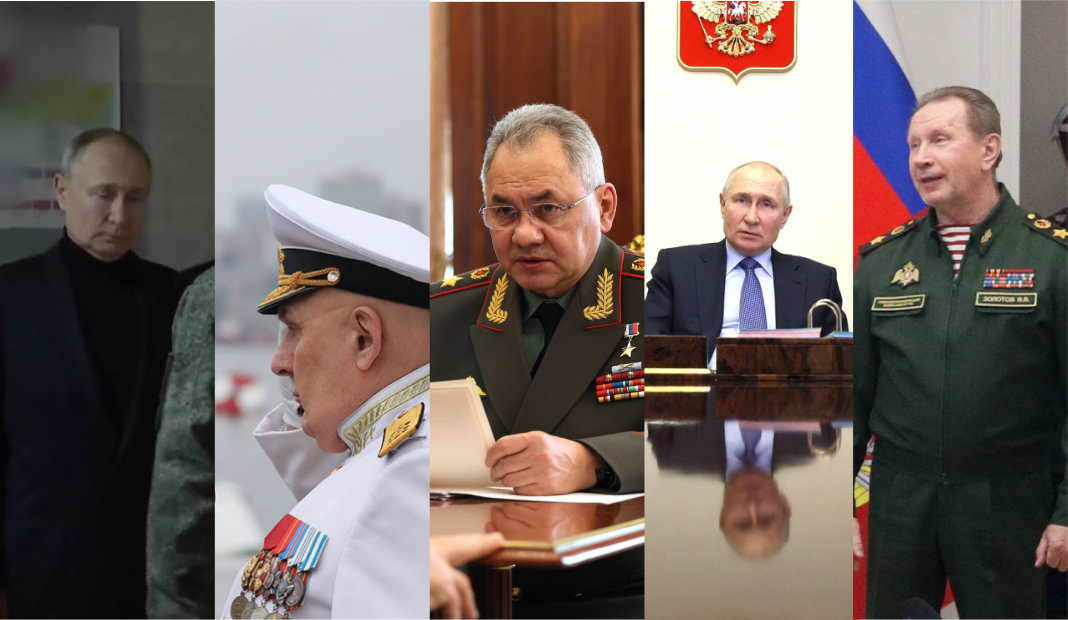This report describes the key events that had an important impact on the political, economic and social processes inside Russia.
Based on the results of the past week, the following trends can be summarised:
- There is a consistent strengthening of the domestic political factor against an intensified pre-election campaign. The internal confrontation between the main groups of influence is significantly intensifying, accompanied by resignations and appointments at various levels. In this situation, the resignation of the governor of the Krasnoyarsk Region, Alexander Uss, a protege of the conditional Shoigu-Deripaska group, is very indicative. In the near future, the confrontation between the groups will intensify.
- For Russia, the Asia-Pacific region is becoming increasingly important, where Moscow has looming common interests with China. As a result, cooperation between the two states has more mutually beneficial positions than in Europe or other regions of the world. In this case, the activation of the Pacific Fleet of the Russian Federation, which shortly will occupy one of the key roles in Russia’s defence capability, looks logical.
- Putin shows considerable fatigue with the Ukrainian issue, but at the same time, does not have any opportunity to freeze or resolve the conflict on favourable terms for Russia. A critical dependence on Beijing and other important geopolitical players in a possible political settlement of the conflict is also gradually emerging. Soon, we should expect attempts to promote new theses and initiatives that, in every possible way, support the negotiation process between Moscow and Kyiv.
During April 17th-23rd the following topics were the most relevant for Russia:
- Meeting of Vladimir Putin with the Minister of Defense of the Russian Federation, Sergei Shoigu
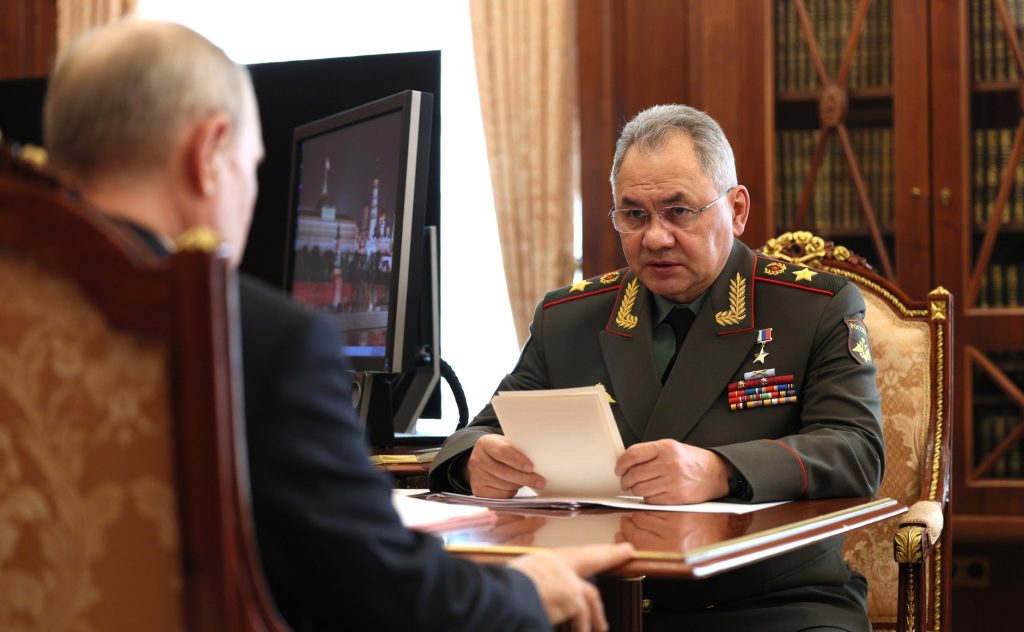
On Monday, April 17, Vladimir Putin met with the Minister of Defense of the Russian Federation, Sergei Shoigu. The main topic of the meeting was Shoigu’s report on conducting exercises in the Pacific Fleet. In particular, the Minister of Defense of the Russian Federation noted that the final stage of training would begin on April 18. At the same time, the Ukrainian issue was raised during the meeting.
Key theses:
- Shoigu: “Following your decision of April 14, an extraordinary inspection of the Pacific Fleet is being conducted. It involved more than 25,000 military personnel, 167 warships and naval support, including 12 submarines, 89 jets and helicopters.”
- Shoigu: “On-duty anti-submarine forces searched for submarines on the approaches to Peter the Great Bay and Avachinsky Bay. Naval aviation of the Pacific Fleet is deployed at operational airfields. The planes of the long-range aviation command have been relocated to advanced airfields.”
- Shoigu: “From April 18, we will begin the final stage of verification, during which ship strike groups, together with coastal missile divisions, practice delivering missile strikes with the execution of electronic launches.”
- Putin: “…to date, we have clear priorities for using the Armed Forces, and above all, it concerns the Ukrainian areas and everything related to protecting our people in the Donbas and other new territories.”
- Putin: “No one has cancelled or removed any tasks for the development of the fleet, including those in the Pacific theatre, and therefore I am asking you to continue your work, of course, and pay attention to the development and preparation of similar activities in other fleets as well.”
- Putin: “Apart from everything else, of course, the fleet’s forces in its separate components can certainly be used in conflicts in any direction. Therefore, I ask you to also have it in the form of it.”
Outcomes and outlook:
The Pacific direction has become a priority for Russia for several reasons. First, it is a strategic field of confrontation with the United States of America, which is trying to turn the Pacific Ocean into a zone of its own military-political and external influence (through QUAD or AUKUS-type structures, establishing special relations with South Korea, Japan, Taiwan, and the Philippines).
Secondly, this is another point of causing Russia and China’s interests (and, in this case, the coincidence of interests). Most likely, the intensification of actions in the Pacific Ocean is a consequence of Xi Jinping’s visit to Moscow: China is interested in strengthening its position in the Pacific Ocean, which is possible only with the support of partnership relations with Russia. Obviously, the Pacific Fleet will be partially entrusted with the responsibility for protecting land territories in the Far East since several army units have been transferred from the Far East to Ukrainian control.
It is also not worth collecting accounts and the fact that the Pacific Fleet with its nuclear missiles is a constant threat to the security of the United States, an element of Russian games in the American direction (with the support of certainty in the issue of the renewal of the Treaty on Strategic Offensive Weapons). Thus, it can be predicted that the Pacific Fleet will soon receive a lot of attention in the mass media in Russia – as in all programs for the development of the Far East.
- Putin’s visit to the headquarters of the “Dnepr” group of troops and the command of the national guard “Vostok”
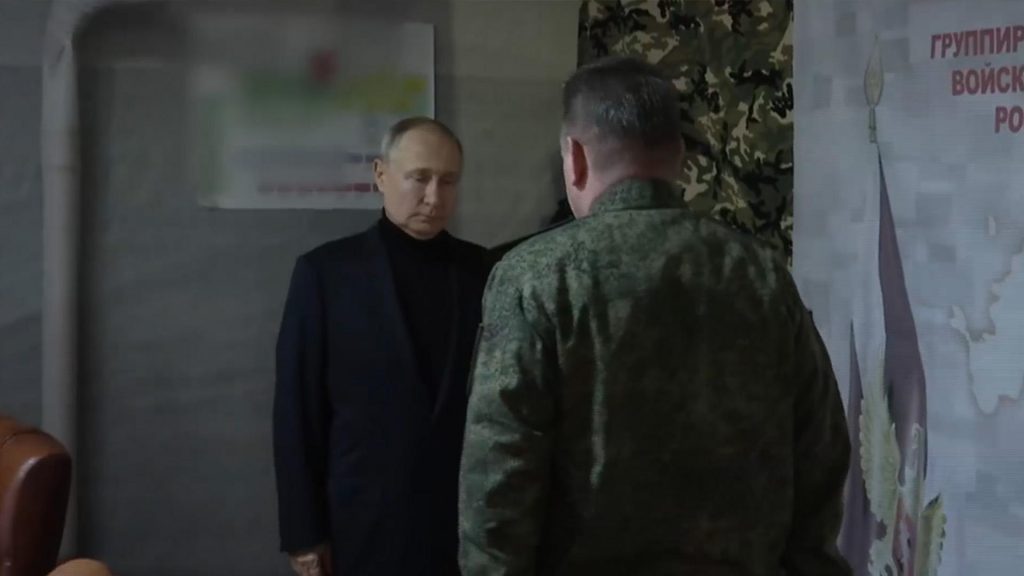
On Tuesday, April 18, the website of the President of the Russian Federation published information about Putin’s visit to the headquarters of the Dnepr group of troops, which is located in the temporarily occupied territories of the Kherson region, as well as the centre of the Vostok national guard, situated on the part of the self-proclaimed “LPR”. During his visit to the military headquarters, the president held meetings with the commander of the airborne troops, Colonel-General Mikhail Teplinsky, the commander of the Dnepr group of troops, Colonel-General Oleg Makarevich, Colonel-General Alexander Lapin, and other military leaders. Putin also congratulated the service members on Easter and gave them copies of the icons.
Outcomes and outlook:
Putin’s trip “to the front” is intended not only to raise morale and show that the president is personally interested in the state of affairs at the front. In fact, the last Russian ruler who was not afraid to go directly to the front line was Nicholas II – all subsequent heads of Russia did not risk their lives. Putin is no exception. In the media plan, he tried to level the topic “Zelensky goes to the front, but Putin is afraid.” A year before the presidential election is also a good media opportunity to show fearlessness and good physical shape.
But something else is essential: Putin went not so much to the front as to inspect representatives of the “authorities” of the occupied territories – the Luhansk and Kherson regions. These regions receive massive subsidies from the Russian Federation’s state budget. Putin’s arrival is like a signal to officials: theft on a large scale will be suppressed, and the “king” is watching the process. The meeting with the generals is a staged action designed to show that Putin is personally in charge of the so-called “SMO”.
At its core, Putin’s trip continues his tour of the occupied territories (he visited Crimea and Mariupol a few weeks ago).
It is striking that the visit did not take place on Monday, as announced, but a few days earlier – several details revealed that Putin was in the occupied territories at least on Friday, April 14.
This is not Putin’s last visit to these regions. Therefore, it is quite possible that following the trip, we can expect new personnel decisions in the occupied regions in the coming weeks.
- Meeting of Vladimir Putin with members of the Government of the Russian Federation
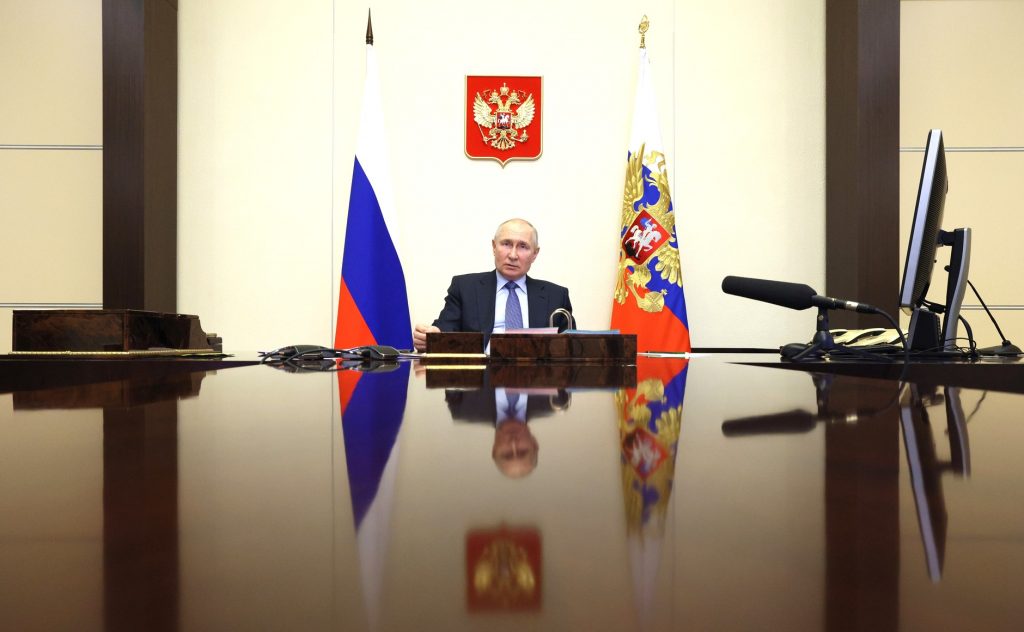
On Wednesday, April 19, Vladimir Putin held a meeting via videoconference with government members. The main topic of discussion was the program to improve the reliability of the country’s power grid complex. The main speakers were the Minister of Energy of the Russian Federation, Nikolai Shulginov, the Governor of the Novgorod Region, Nikita Andreev, and the Director of PJSC Rosseti (Russian Networks), Andrey Ryumin.
At the same time, reports were also heard from other government members during the open part of the meeting. In particular, Deputy Prime Minister Marat Khusnullin, Minister for Civil Defense, Emergencies and Disaster Relief Alexander Kurenkov, Governor of the Kamchatka Territory Vladimir Solodov, Deputy Prime Minister Tatyana Golikova, Deputy Prime Minister Alexander Novak, and Minister of Agriculture Dmitry Patrushev.
Outcomes and outlook:
The big meeting between Putin and the Government of the Russian Federation pursued several main goals simultaneously. First, on March 23, the annual report of the Government of the Russian Federation was held in the State Duma (Ascolta wrote about it here). Then, exactly one month later, on April 23, Mikhail Mishustin approved the list of instructions based on the results of the annual report of the Cabinet of Ministers in the Duma. In particular, the Ministry of Finance, the Ministry of Labour, the Ministry of Justice and the Ministry of Economic Development have been tasked with preparing proposals for legislative changes that provide for empowering local governments with the right to develop and implement measures of social support and assistance to the families of military personnel participating in the [so-called] “SMO”.
Aiming to increase the accessibility of social facilities in rural areas, the Ministry of Transport and interested federal and regional authorities were instructed to analyse public transport routes in rural areas by September 1 and submit proposals for their development.
The Ministry of Education and Science, the Ministry of Finance and the Ministry of Industry and Trade must prepare proposals by June 1 on the implementation of measures to increase the attractiveness of university educational programs in engineering and technical specialities, as well as to increase the target figures for admission to budget-funded education for such programs, the report says.
The Ministry of Health, the Ministry of Education and Science, as well as the Ministry of Education, together with interested federal and regional authorities, were instructed to prepare proposals for increasing budget places for the most popular medical specialities in colleges and universities, including based on targeted training agreements.
In this case, the meeting between the President and the Government, which took place on the eve of Mishutin’s official approval of the list of instructions, is a factor in additional coordination of the domestic political agenda at the highest level and also demonstrates Putin’s increased involvement in domestic political issues.
Secondly, the intensification of preparations for the presidential elections is worth noting, which is an additional factor in Putin’s high involvement in domestic political issues. The issues discussed at the open part of the meeting concern several strategic areas that affect the interests of a significant part of the Russian population. In particular, Marat Khusnullin announced plans to implement several infrastructure facilities, including those in the temporarily occupied territories of Ukraine. According to him, the government’s new program is designed to repair and create over 1,000 infrastructure facilities.
In turn, Alexander Kurenkov presented a report on the situation with forest fires, floods, and other emergencies in Russia. Notably, the central part of his report focused on the Far East region, which was also mentioned by the Governor of the Kamchatka Territory, Vladimir Solodov. In connection with the recent eruption of the Shiveluch volcano, the ash emission was up to 20 kilometres in height, which not only caused serious damage to nearby settlements but will also have a severe impact on the global environmental situation (environmentalists predict a short-term effect that could lead to global cooling by several years). In general, there has been an increase in environmental issues, which are also acute in the Donbas, requiring immediate intervention from both sides.
At the same time, Alexander Novak reported on the successful implementation of the gasification program in the country. According to the relevant minister, by 2024, it should cover more than 74% of all households in Russia. As of January 1, 2023, this indicator is fixed at around 73%. This issue is one of the most important for remote regions. Putin plans to place one of the major stakes in mobilising the electorate, putting them forward as a counterweight to the more liberal and opposition-minded central regions.
Весьма показательным был доклад Дмитрия Патрушева о ситуации в аграрной сфере. Отмечая рекордные показатели урожайности, Патрушев отметил и положительную динамику на временно оккупированных территориях Украины. По его словам, на временно оккупированных территориях Луганской, Донецкой, Запорожской и Херсонской областей засеяно 1,3 миллиона гектаров, из которых 95 процентов находятся в хорошем и удовлетворительном состоянии. Более того, Патрушев отмечает, что на данных территориях ситуация обстоит даже лучше, чем во многих других регионах России. Таким образом, можно говорить о попытке России создать образ заботливого управления на оккупированных территориях, в связи с которым происходит постоянный рост основных экономических и социальных показателей.
Dmitry Patrushev’s report on the situation in the agrarian sector was very indicative. Noting the record yields, Patrushev also noted the positive dynamics in the temporarily occupied territories of Ukraine. According to him, 1.3 million hectares have been sown in the temporarily occupied territories of Luhansk, Donetsk, Zaporizhzhia and Kherson regions, of which 95 per cent are in good and satisfactory condition. Moreover, Patrushev notes that the situation in these territories is even better than in many other regions of Russia. Thus, we can talk about Russia’s attempt to create an image of caring management in the occupied territories in connection with the constant growth of basic economic and social indicators.
In general, Putin’s meeting with the Government was another attempt to demonstrate maximum calm against external challenges and threats. Such an approach helps to control the situation in the short term, completely controlling the public mood in the run-up to the elections. However, at the same time, it is possible to predict a significant deterioration in the situation already in the next 3-5 years when the Russian economy reaches its strength limit and begins to feel the real consequences of the sanctions imposed and the reduction (or redistribution) of sales markets.
- Adoption of amendments on the deprivation of acquired Russian citizenship for incitement to extremism and for “discrediting the Russian Armed Forces”
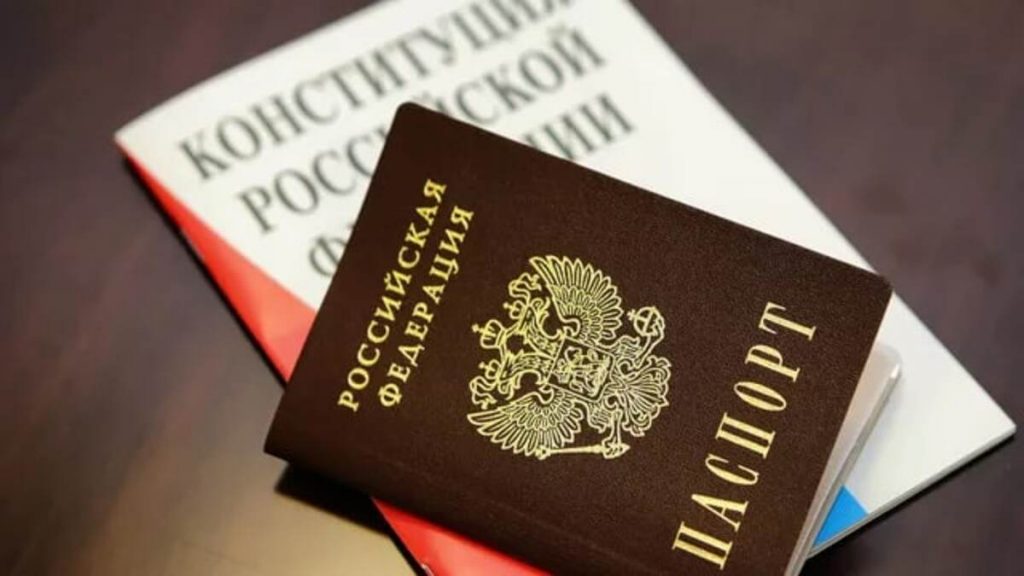
On Tuesday, April 18, the State Duma of the Russian Federation, in the second and third readings, voted for the adoption of an amendment to the draft law “On Citizenship of the Russian Federation”, according to which acquired citizenship can be revoked for publicly calling for extremism, encroachment on the life of a statesman and for organising an armed rebellion to forcibly change the constitutional order of Russia.
Key theses:
- The draft law provides for the deprivation of citizenship for terrorist crimes, serious crimes against the state, as well as for crimes in the field of drug trafficking, forgery of documents, or at the voluntary request of a citizen.
- The amendment supplements this list with the articles “Public calls for extremist activity”, “Armed insurrection”, and “Encroachment on the life of a serviceman or public figure”.
Outcomes and outlook:
It is noteworthy that these amendments apply only to citizens with acquired citizenship; that is, they are focused primarily on representatives of large businesses who have received Russian citizenship already in the course of expanding their business in Russia, as well as residents of temporarily occupied territories who are massively receiving Russian passports. in the last nine years.
Thus, we can talk about an attempt to eliminate the risks of increasing opposition sentiment in the temporarily occupied territories (since any person can lose Russian citizenship and be forced to go through a filtration system to return to Ukraine), as well as to demonstrate to foreign representatives of large businesses in Russia that calls for a change in the state strategy directly affect the possibility of further doing business in Russia.
At the same time, all Russian citizens born before the collapse of the Soviet Union, that is, the main part of representatives of the political and business circles of the Russian Federation, fall under this amendment since their citizenship is also considered acquired. Thus, we can talk about a serious expansion of the scope of this amendment, which, along with the base of foreign agents, significantly complicates any opposition activity on the territory of Russia.
Moreover, most Russian “oppositionists” who criticise the actions of the Russian authorities and the Russian army may be deprived of their citizenship, which eliminates their chances of participating in any elections. First, we are talking about Khodorkovsky, Kasparov and other representatives of the “opposition” movements trying to “criticise” Putin and his actions in Ukraine.
- Meeting of Chairman of the State Duma of the Russian Federation Vyacheslav Volodin with the head of the Russian Guard Viktor Zolotov
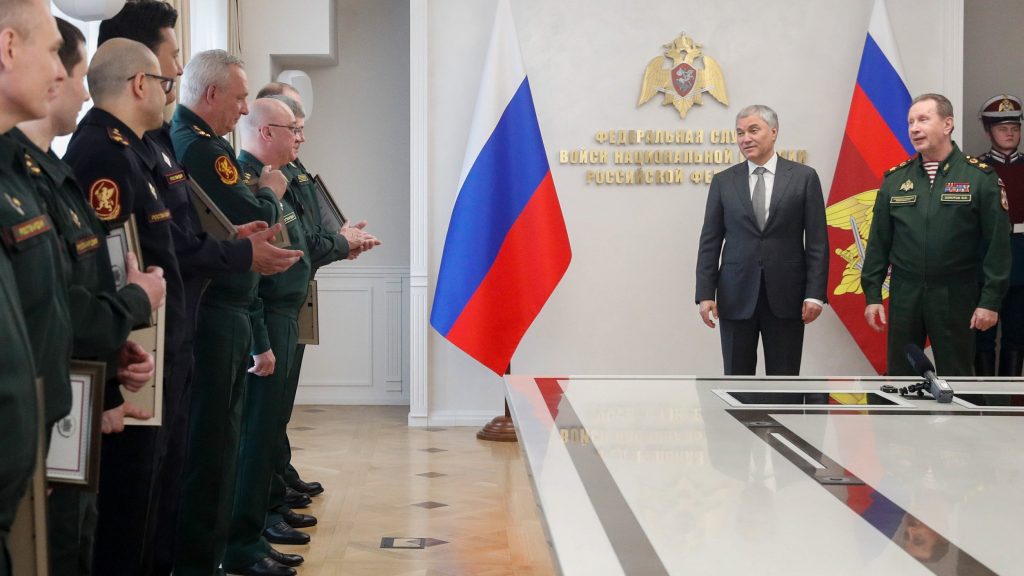
On Wednesday, April 19, Chairman of the State Duma of the Russian Federation Vyacheslav Volodin met with the head of the Russian Guard, during which the parties discussed issues of legislative support for the activities of the Russian Guard, primarily in connection with the fulfilment of tasks in the so-called “Northern Military District” zone. In turn, Volodin stressed that “soldiers and officers, as well as their families, must be provided with everything necessary. All factions of the State Duma are united in this.” He also presented awards of the State Duma to distinguished servicemen of the Russian Guard.
Outcomes and outlook:
Recently, information about the launch of fundamental reforms in the management of military units in the system of the Armed Forces of the Russian Federation (a conditional transition from an industrial, bureaucratic ideology to a post-industrial ideology of network management) has been actively discussed in Russian near-political circles. In particular, we are talking about the creation of new private military campaigns (like PMC “Wagner”), each of which will have a personal area of responsibility, both inside Russia and abroad (for example, areas of interest in Africa or the Middle East ). Ascolta sources confirm similar information.
In this situation, it is essential to note the strengthening of the position of the head of the Russian Guard, Viktor Zolotov, who has recently been increasingly involved in the formation of a new military formation in the self-proclaimed “LDNR”. This is even though Ramzan Kadyrov (who dreamed of heading the National Guard) and Yevgeny Prigozhin have been actively fighting against Zolotov over the past year. By the end of the year, Zolotov managed to find a common language with both Kadyrov and Prigozhin, obviously not without mediation from Putin. Now the contradictions between them are practically exhausted.
So, at the end of March 2023, “deputy head of the Department of the Federal Service of the National Guard Troops of the Russian Federation” for the [self-proclaimed] “DPR” Alexander Khodakovsky said that based on the Vostok brigade (114th separate guards motorised rifle Enakievo-Danube brigade in the [self-proclaimed] “DPR”, under his leadership, the special forces of the Russian Guard are being created in the [self-proclaimed] “DPR”: “The tasks will be difficult, the number will be significant – we announce recruitment to the unit.”
Khodakovsky announced that he was leaving the structure of the Ministry of Defense of the Russian Federation and, under the head of the Russian Guard, Viktor Zolotov, was creating a kind of hybrid of a volunteer unit and special forces – like the Chechen “Akhmat”. In this situation, the formation of a conditional group of influence at the highest political level, “Zolotov-Kadyrov-Volodin”, is clearly visible, where Zolotov is the main link.
It is also noteworthy that other representatives of the occupation authorities and big business are actively trying to create their PMCs in the temporarily occupied territories of Ukraine. So, according to Ascolta, a structure controlled by the Russian oligarch, Konstantin Malofeev is actively developing – PMC “BARS”, as well as PMC “Konvoy”, which is financed by the “head” of the Crimea, Sergei Aksyonov and has strong ties with the structures of Yevgeny Prigozhin. Moreover, according to reports, both Malofeev and Aksyonov offered Khodakovsky an allied pool of assets, but apparently, Zolotov’s proposal was more successful.
At the same time, Zolotov’s moderate relationship with Prigozhin suggests that both projects (the Wagner PMC and Zolotov’s DNR special forces) will develop not in opposition to each other but in parallel, strengthening the positions of the Russian Federation in the Donbas. In this case, Zolotov’s official meeting with Volodin was only an attempt to legalise the new system at the highest level and demonstrate the creation of a new alliance that shows hostility towards Sergei Shoigu and the Russian Ministry of Defense.
Putin’s military reform is moving towards the division of military blocs within the country to prevent any attempts to repeat the plot of General Rokhlin and the possible political ambitions of individual military men.
- Resignation of the Governor of the Krasnoyarsk Territory, Alexander Uss
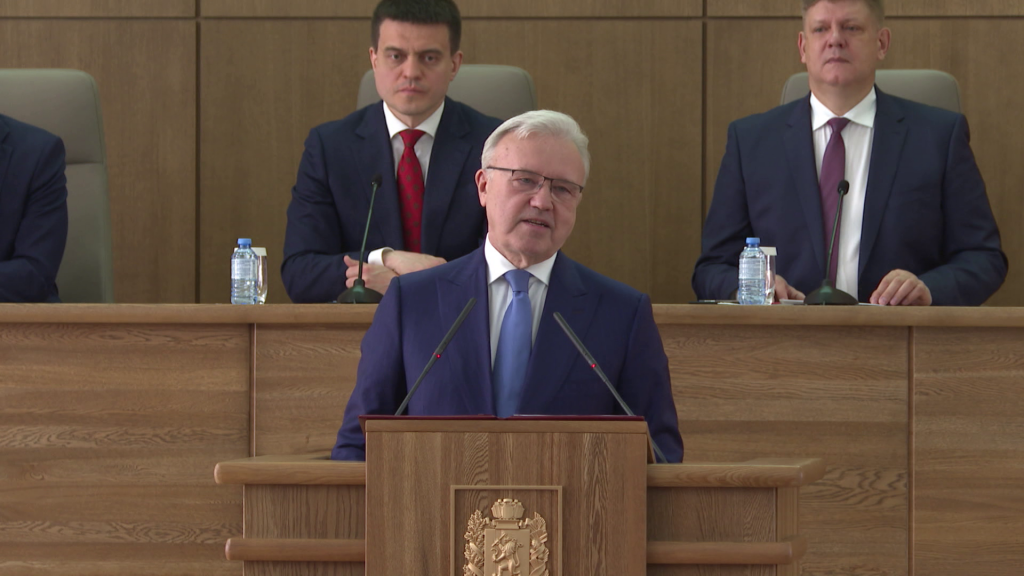
On Thursday, April 20, the Governor of the Krasnoyarsk Territory, Alexander Uss, announced his resignation and transfer to another position at the federal level. He argued this decision with a proposal from Vladimir Putin. At the same time, the information space has recently been actively discussing the news about the escape of the son of Alexander Uss, Artem, who was placed under house arrest in Italy but could leave illegally for Russia.
Outcomes and outlook:
The resignation of the Governor of the Krasnoyarsk Territory, Alexander Uss, who headed the region for six years, became a mini-sensation in Russia. Uss was considered a protege of Sergei Shoigu and Oleg Deripaska, making him practically unsinkable. In June 2022, Uss tried to enlist hardware support from Igor Sechin – he joined the board of directors of Rosneft. The fact that Uss’s resignation became so sudden (even though he was an outsider in all the ratings of confidence in governors), as well as the fact that Mikhail Kotyukov, a representative of another generation (he is 18 years younger than his predecessor), was appointed to his place, became a mini sensation. Putin is carrying out the rejuvenation of personnel on the ground. Most likely, the power structure in Moscow will be formed by the current governors after the presidential elections in 2024. The appointment of Kotyukov is a hardware victory for the Kovalchuk-Kiriyenko group. Some experts point out that Kotyukov, who was previously Deputy Minister of Finance of the Russian Federation, was the leading financier of the country’s education system.
Russian telegram channels write: “For Kotyukov himself, the transfer to the Krasnoyarsk Territory is a new career step, given the region’s importance. He will face a complex system of relations between federal and regional groups in the region, which will not be easy to survive. The immediate and main problem of Kotyukov is to withstand a retaliatory attack from Shoigu-Deripaska, who, of course, will not leave defeat so easily.
This appointment should be considered one of the first in the expected series of rotations and replacements in the local power structures – on the eve of the start of the presidential campaign.
- Change of command of the Pacific Fleet
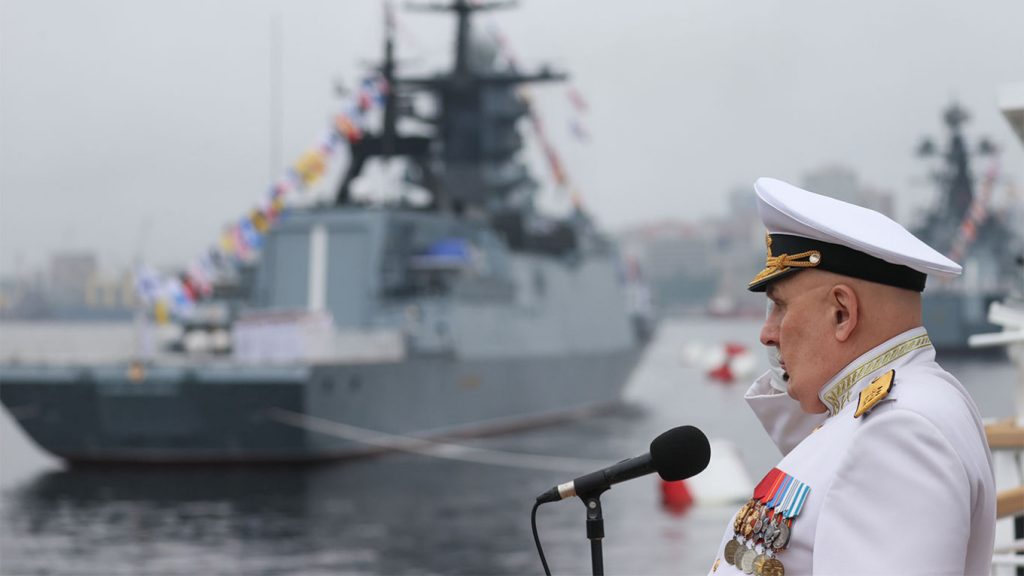
On Thursday, April 20, the Commander of the Pacific Fleet, Admiral Sergei Avakyants, left his post less than a week after a sudden check of the combat readiness of the fleet units. At the same time, the presidential envoy to the Far Eastern Federal District, Yuri Trutnev, said that Avakyants had moved to a new position – he would head the headquarters overseeing centres for military sports training and patriotic education. They will be created in 12 regions, including the [self-proclaimed] “DPR”.
It is worth noting that Sergey Avakyants has headed the Pacific Fleet since May 2012. Admiral Viktor Liina, who previously commanded the Baltic Fleet, was appointed the new commander of the Pacific Fleet.
Outcomes and outlook:
This replacement should be considered in the context of increased attention of the Russian leadership to the Pacific Fleet. Admiral Sergei Avakyants retired due to his age – on April 6, he turned 65. Neither Putin nor the military command had any questions about Avakyants himself. The appointment of Admiral Viktor Liina to his place was also predictable – 54-year-old Liina is one of the most respected naval commanders in Russia. In addition, he repeatedly demonstrated the ability to carry out any orders – at the end of 2018, he, being the chief of staff of the Black Sea Fleet, gave the order to attack Ukrainian ships sailing through the Kerch Strait to the Sea of Azov. Liina is considered Putin’s “favorite”. In the system of informal connections, Liina is closely connected with the Deputy Chief of the General Staff of the Armed Forces of the Russian Federation, Vice Admiral Vladimir Vorobyov. According to forecasts, Vorobyov may be appointed Baltic Fleet commander instead of Liina. Thus, an informal axis based on personal and business relations will be built: the Baltic Fleet – the Pacific Fleet. Shortly, the admiral tandem Liina – Vorobyov may become one of the main groups of influence in the system of the Armed Forces of the Russian Federation.

